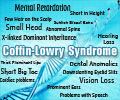A team of international scientists claim to have identified the genes responsible for intellectual disability.
A team of international scientists claim to have identified the genes responsible for intellectual disability.
The breakthrough is reported in the February issue of the American Journal of Human Genetics and is a result of collaboration of scientists from the Katholieke Universiteit Leuven in Belgium, the Wellcome Trust Sanger Institute in Cambridge, England and the Genetics of Learning Disability (GOLD) Service in New South Wales.The team has revealed that mutations of a small part of the X chromosome lead to mental retardation.
Intellectual disability affects one to three per cent of the world's population, with 30 per cent more men affected than women.
Dr Gecz, a senior researcher who is based at the Women's and Children's Hospital in Adelaide, says the duplicated genes - dubbed HSD17B10 and HUWE1 - produce excess protein, which appears to be the trigger leading to intellectual disability.
The researchers used specialised molecular technology to study the X chromosomes of more than 500 families diagnosed with various forms of X chromosome-linked mental retardation.
In six of the families they discovered that a certain part of the X chromosome had been duplicated. Four of these families were from Australia. Moreover, in one of these genes, HUWE1, they identified a further three mutations in another three families, one of them from Australia.
Advertisement
"Through this research we hope to uncover the important role that these genes and their proteins play in the normal brain development and thus learning and memory."
Advertisement
Dr Gecz's research has been funded by the Australian National Health and Medical Research Council Program grant, which is administered through the University of Adelaide.
"Our next step is to see how frequent these mutations are among the isolated cases. Also, we will try to understand the molecular pathology of the associated disease and investigate the routes for possible future interventions and treatments."
Source-Medindia
GPL/L









